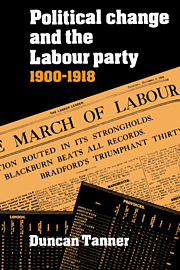Summary
In 1906 the Liberal party won a landslide electoral victory. Labour, usually acting in alliance with the Liberals at the parliamentary level, but always attempting to erode its ally's position in the constituencies, was at best a small third force. In 1918, however, Labour broke out of this alliance and became the major opposition to the Government. In discussing how and why the pattern of politics changed, scholars have always recognised that two wider questions underpin their analysis. They have identified changes in the determinants of political behaviour and in the nature of the parties. A switch from ‘religious’ to ‘class’ based allegiances was encouraged, or reflected, by the rise of mature, ‘national’, parties. For some, the Liberals were a class-based, and hence ‘viable’ party by 1910. New Liberal ideas created a materially attractive party image through the politics of social reform. For others, a working-class cultural unity – and/or experience of trade union action – created a ‘collectivist’ outlook and a form of class consciousness which found its ‘natural’ expression in the Labour party. For both schools, dynamic forces (ideas or class consciousness) swept away the old politics. In the process, they also altered the nature of that political party. The Liberals became a social democratic force (for Dr Clarke); Labour became the voice of the trade unions and a non-revolutionary sense of class solidarity (for Dr McKibbin).
- Type
- Chapter
- Information
- Political Change and the Labour Party 1900–1918 , pp. 419 - 442Publisher: Cambridge University PressPrint publication year: 1990



